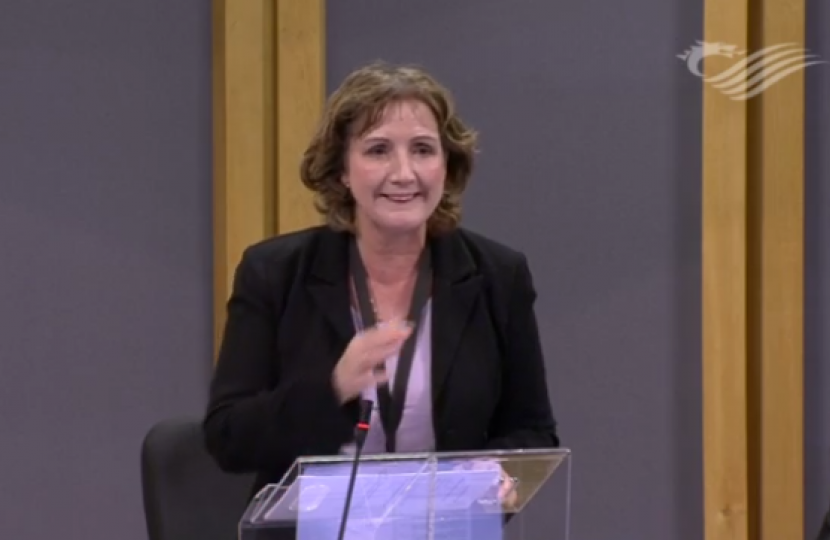
Janet Finch-Saunders AM - Speaking on the Plaid Cymru Debate on Public Services
It is clear from the proposals with regards to Regional Combined Authorities put forward in Plaid Cymru’s manifesto, and in the Cabinet Secretary’s local government reform statement earlier this month, that this is one of those mysterious areas in which Labour and the Party of Wales have done a deal, and I am disappointed that these workings have not been more open and indeed more transparent.
It is vital to remember, both here in this Chamber, and in the back-office workings on the Fifth Floor, that it is to the people of Wales that we are all – irrespective of political colour – accountable to the electorate.
It is they for whom we are seeking to secure and improve services, and it is upon them that Labour and Plaid Cymru are now seeking to work together to deliver the aims of the Plaid Cymru political manifesto.
What matters to our hardworking families is not the intricate structures of local government, but the security of knowing that services will be delivered in an efficient and cost effective way.
Welsh Conservatives believe that public services are best delivered locally, so taxpayers can hold local representatives to account for what happens in their community. Indeed, Paul Williams himself has highlighted concerns that the pooling of sovereignty by councils to form regional consortia will be “very tricky.”.
To justify these additional costings, Cabinet Secretary, how do you envisage regional combined authorities to be democratically engaged and accountable to the electorate?
After spending over £130,000 on the Williams Commission, and a further £434,000 on the Local Democracy and Boundary Commission for Wales last year, the cost to the taxpayer of local government reform planning and electoral reviews is well over half a million pounds, and we are no closer to seeing any meaningful changes.
Instead we have a discarded, expensive folly, reports, draft local government bills, lining the waste paper bins of the latest Welsh Labour Government. Goodness knows the full costs associated with that process, of which we have requested such detail.
Again, Paul Williams has spoken of his dismay that since the publication of his report almost 3 years ago, so little has changed.
The Welsh Conservatives make no bones about this. We have always been strong and clear:
- We would hold referenda to ensure public support for local government mergers of any size
- We would ensure full openness and accountability at all levels of governance
- We would publish all local authority spending, such as Welsh Conservative-led Monmouthshire Council, who have been noted by the Wales Audit Office as having “effective financial governance”
It is abundantly clear that the Cabinet Secretary does not wish to fall foul of his own Labour councillors so early on in his new portfolio role – and who could blame him – given the demise of his predecessor charged with bringing about such reform.
But we do need to look at new, smarter, more open ways of working – there’s no denying that.
Certainly, we need to examine the way in which local government is financed, to ensure that rural authorities receive fair funding equivalent to all communities across Wales, yet once again we see Powys struck by the biggest cuts in the provisional local government settlement.
Coupled with the centralisation of Social Services spend, it is vital that the Welsh Government come forward with a clear strategy on how public services will be improved, not downgraded, as a result of their consistent cuts to Local Authorities, and those concerns are echoed in the first two points of this motion.
They could, and should of course, look to Monmouthshire for examples of good practice, transparency, efficiency and democracy accountability. There, the three Social Services localities in have now have co-located social care and occupational therapy staff under the management of a single integrated care manager, providing easier access to senior occupational therapy practitioners for advice on complex cases.
To be truly accountable for the delivery of these services, it is crucial that we increase transparency in local authority senior staff budgeting to ensure that executive officer pay is sustainable and cost effective for council tax payers, and not to the detriment of the delivery of local services.
In terms of senior salaries, whilst the leaders of the three biggest councils in Wales all receive £53,000, Chief Executive salaries are far higher…
Cardiff’s receives a salary of £170,000 per year – more than our Prime Minister and the Welsh Government’s Permanent Secretary on £160,000.
Across Wales, 14 Chief Executives are paid a salary higher than the First Minister!
Yet despite these fat cat salaries, just this week the Auditor General for Wales has called for better leadership in local government to improve community safety, commenting on "disjointed" responsibilities and leadership, alongside cuts of 32.7% in real-terms expenditure by local authorities on management of community safety in the past five years.
Once more, on these benches, we are calling for openness and transparency of local government and the decision-making related to it.
Once more, Labour and Plaid Cymru have struck a deal behind closed doors.
And once more, it is the people of Wales who lose out, as they see their council tax bills rise year on year, front line services cut, and proposals for yet another layer of costly bureaucracy put forward, taking power further away from them and their communities.
